#One Person Company
Text
#Legal Vidur Daily Update

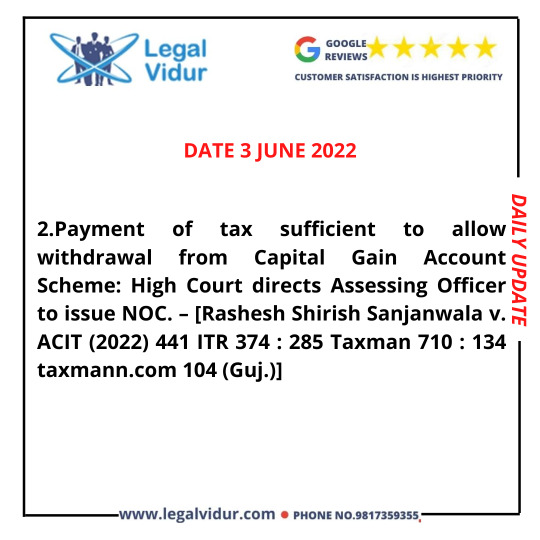
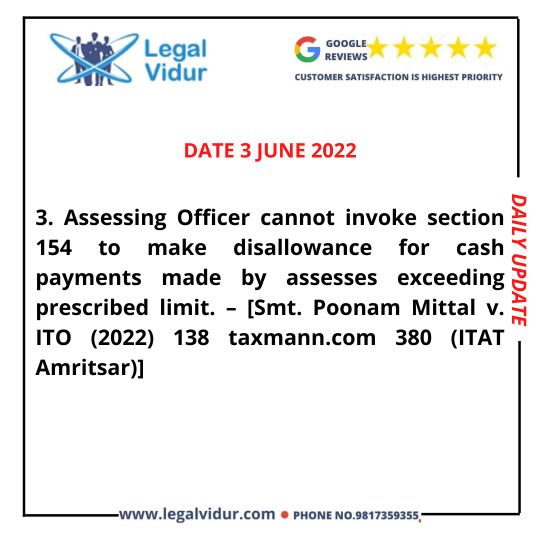
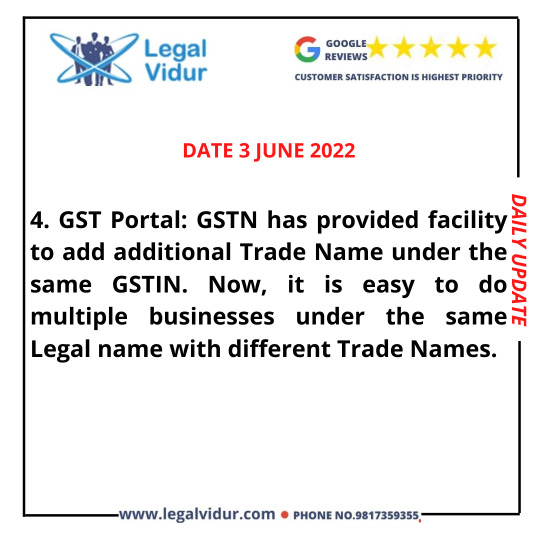

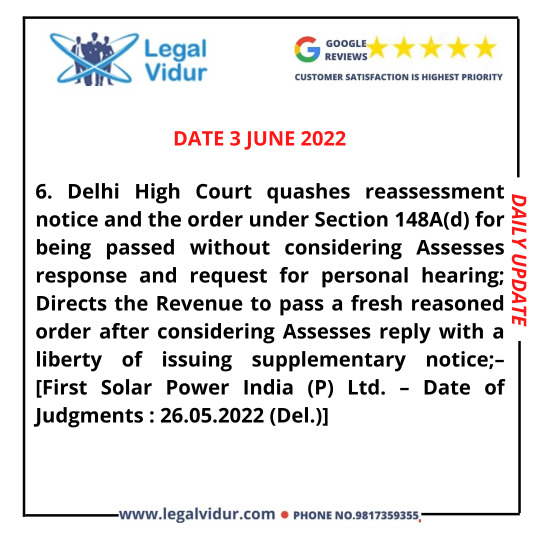

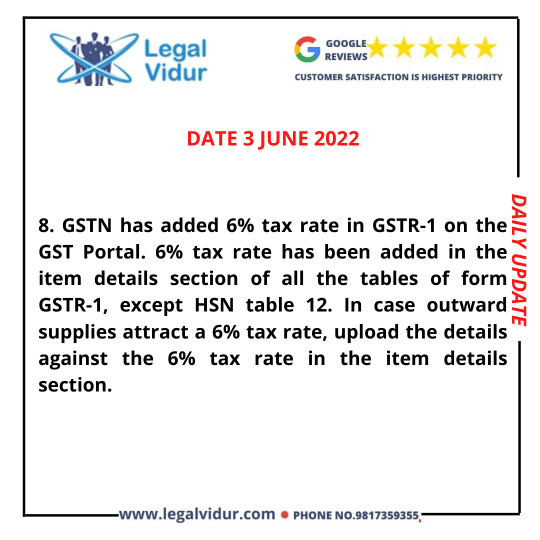
#Legal Vidur#Income Tax Return#One Person Company#Private Limited Company#Limited Liability Partnership#Public Limited Company#Startup India#FSSAI Registration#APEDA Registration#MSME Registration
2 notes
·
View notes
Text
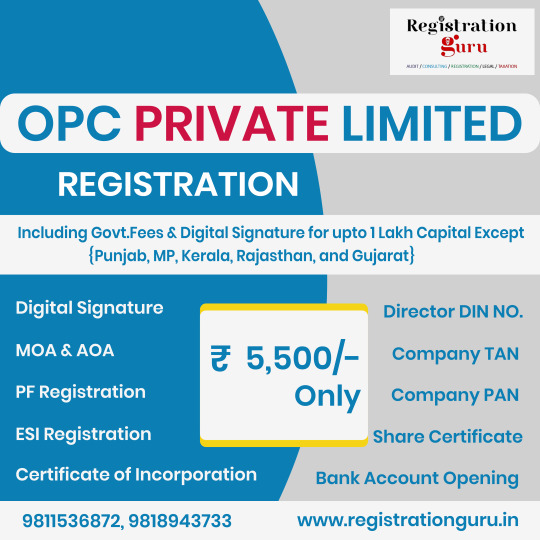
Register your company as a One Person Company (OPC) through Registration Guru.
For more information
Call us:- 9811536872
Visit us:- https://registrationguru.in/one-person-company-registration
Email us:- [email protected]
1 note
·
View note
Text
A Beginner's Guide to OPC Registration

Are you ready to turn your entrepreneurial dream into reality as a solo founder? Registering a One Person Company (OPC) could be the perfect starting point for your business journey. OPCs provide a strong foundation for aspiring entrepreneurs by offering the advantages of limited liability and a separate legal identity. If you're new to OPC registration, fear not! This guide will walk you through the process step by step, making sure about a smooth and successful registration experience.
Process of OPC Registration Online
Understanding OPC: Before diving into the deep ocean of registration process, it's essential to understand the concept of OPCs. Unlike sole proprietorships, OPCs offer limited liability protection, that means that your personal assets are separate from your business liabilities. This structure provides credibility and security, which is essential for establishing trust with clients and partners.
Selecting a Unique Name: First of all, for OPC registration you have to select a unique name for your company. Make sure that your chosen name complies with naming guidelines and isn't already in use by another entity. Once you've decided a name for your company, reserve it via Ministry of Corporate Affairs (MCA) portal.
Obtaining Digital Signature and DIN: After that, you have to acquire a Digital Signature Certificate (DSC) and Director Identification Number (DIN), which are mandatory for OPC directors. These can be obtained online through the MCA portal by submitting all the necessary documents.
Document Preparation: Then, you should have to gather all the required documents, including address proof, identity proof, and proof of registered office, for OPC registration. Make sure that all documents are accurate and up to date to avoid any delays in the registration process.
Filing for OPC Registration: Once you have all the necessary documents in order, you can file for OPC registration via MCA portal. Submit all the required documents and pay the registration fee, then wait for verification.
Upon successful verification, you'll receive the Certificate of Incorporation, officially establishing your OPC. Congratulations! You're now ready to start your entrepreneurial journey confidently with OPC Registration Online, along with the benefits of limited liability and a solid legal foundation. Remember to fulfill all the ongoing compliance requirements and prepare your OPC for long-term success.
#Company Registration#Online Company Registration#Online Company Registration in India#Company Registration in India#One Person Company#OPC#OPC Registration#OPC Registration Online#OPC Registration Online in India
0 notes
Text
Can OPC be Converted into a Private Limited Company?

Yes, an OPC (One Person Company) can be converted into a private limited company under certain circumstances, as provided for in the Companies Act, 2013, and the rules prescribed by the Ministry of Corporate Affairs (MCA). Here's an overview of the conversion process:
Eligibility:
To convert an OPC into a private limited company, the OPC must have completed two years from the date of its incorporation.
Minimum Requirements:
The OPC must have a minimum of two directors and a minimum of two shareholders at the time of conversion.
Passing Special Resolution:
The sole shareholder of the OPC must pass a special resolution for conversion into a private limited company. This resolution must be approved by the member of the OPC and filed with the Registrar of Companies (ROC).
Application for Conversion:
Once the special resolution is passed, the OPC needs to file an application for conversion with the ROC within a specified period, along with necessary documents and forms prescribed by the MCA.
Documents Required:
The documents required for conversion typically include the special resolution, the altered memorandum of association and articles of association reflecting the new status as a private limited company, a declaration by the director(s) confirming compliance with the conversion requirements, and any other documents as required by the ROC.
Approval:
Upon receipt of the application and necessary documents, the ROC will verify the same. If everything is found to be in order and compliant with the applicable laws, the ROC will approve the conversion, and the OPC will be deemed to be a private limited company from the date of approval.
Amendments to PAN, TAN, and other Registrations:
After conversion, the company must make necessary amendments to its PAN (Permanent Account Number), TAN (Tax Deduction and Collection Account Number), GST (Goods and Services Tax) registration, and other registrations as required.
It's important to note that the conversion process involves adherence to specific timelines, procedures, and compliance requirements as laid down by the Companies Act and regulations issued by the MCA. Therefore, it's advisable to seek professional guidance from legal and financial experts to ensure smooth and compliant conversion from an OPC to a private limited company.
#efiletax#business#one person company#private company#taxes#OPC be Converted into a Private Limited Company
0 notes
Text
What is OPC? An One Person Company is a type of company established by a single individual, who acts as both the shareholder and the director. Eazybahi Solutions guide you.
One Person Company (OPC) was introduced to encourage entrepreneurs who are capable of starting a venture on their own but are deterred by the requirement of having at least two members, as mandated for a private limited company. OPC, as the name suggests, allows a single individual to establish and run a company, thereby providing a distinct legal identity and limited liability protection. Governed by the Companies Act, 2013, OPCs offer a simplified framework for solo entrepreneurs to operate within the corporate structure.
0 notes
Text
Why OPC Company Registration is the Best Choice for Solo Entrepreneurs in India

What is OPC Company Registration?
As a solo entrepreneur in India, you may be wondering what the best choice for registering your company is. One option that stands out is OPC (One Person Company) registration. OPC company registration in India is a legal structure that allows a single individual to operate as a separate legal entity. This means that as a solo entrepreneur, you can enjoy the benefits of limited liability and legal recognition that come with a registered company. OPC registration provides a unique opportunity for solo entrepreneurs to establish a business entity that is separate from themselves, offering credibility and protection.
Advantages of OPC Company Registration in India
There are several advantages to opting for OPC company registration as a solo entrepreneur in India. First and foremost, limited liability is a key benefit. By registering your company as an OPC, you are protecting your assets from any liabilities that may arise from your business operations. This means that your assets, such as your house or savings, will not be at risk in case of any financial or legal issues faced by your company.
Another advantage of OPC company registration is that it provides a separate legal entity status to your business. This means that your company will have its own legal identity, distinct from your identity. This legal recognition helps in gaining trust and credibility in the market, making it easier to attract clients, investors, and business partners. Additionally, OPC registration allows you to avail yourself of various tax benefits and incentives offered by the government of India, such as exemptions on capital gains and simplified compliance requirements.
Requirements for OPC Company Registration in India
To register your OPC company in India, you need to fulfill certain requirements. Firstly, the company must have only one shareholder and one director. This means that as a solo entrepreneur, you can be the sole shareholder and director of your OPC. Secondly, the company's name must end with "Private Limited." Thirdly, you need to have a registered office address in India where all official correspondence will be sent.
Furthermore, it is important to note that only a natural person who is an Indian citizen and resident in India for at least 182 days in the previous calendar year can form an OPC. Also, an individual can only incorporate one OPC at a time. These requirements ensure the integrity and authenticity of OPC registration in India.
A step-by-step process for OPC Company Registration
The process of OPC company registration in India involves several steps. This is a step-by-step tutorial to assist you in easily completing the registration process:
Obtain a Digital Signature Certificate (DSC): A DSC is required for online filing of documents. A DSC is available from accredited organizations.
Obtain a Director Identification Number (DIN): The next step is to apply for a DIN, which is a unique identification number for directors. This can be done online through the Ministry of Corporate Affairs (MCA) portal.
Name Approval: Choose a unique and suitable name for your OPC and apply for name approval through the MCA portal. The name ought to adhere to the MCA's naming requirements.
Drafting and Filing Documents: Prepare the necessary documents, such as the Memorandum of Association (MOA) and Articles of Association (AOA), and file them with the Registrar of Companies (ROC) along with the required fees.
Payment of Fees: Pay the prescribed fees for OPC registration through the MCA portal.
Certificate of Incorporation: Once all the documents are verified and fees are paid, the ROC will issue a Certificate of Incorporation, which signifies the official registration of your OPC.
Documents Required for OPC Company Registration
To register an OPC in India, you need to submit certain documents along with the application. Here is a list of the essential documents required for OPC company registration:
Identity proof of the director/shareholder: This can be a PAN card, Aadhaar card, or passport.
Address proof of the director/shareholder: This can be a recent utility bill, bank statement, or passport.
Passport-sized photographs of the director/shareholder.
Proof of registered office address: This can be a rent agreement, lease agreement, or ownership proof of the premises.
Signed and notarized copies of the Memorandum of Association (MOA) and Articles of Association (AOA).
Consent to act as a director and file the declaration of compliance.
Any other documents as required by the ROC during the registration process.
Ensuring the accuracy, completeness, and proper attestation of all documents is crucial to prevent any potential delays or rejections during the registration process.
Benefits of Choosing OPC Company Registration for Solo Entrepreneurs
Opting for OPC company registration as a solo entrepreneur in India can offer numerous benefits. One of the key benefits is limited liability protection, which ensures that your assets are safeguarded in case of any financial or legal issues faced by your company. This gives you comfort and lets you concentrate on expanding your company without worrying about losing your assets.
Another benefit is the legal recognition and credibility that comes with OPC registration. Being a registered company gives your business a professional image, making it easier to attract clients, investors, and business partners. It also allows you to enter into contracts and agreements on behalf of your company, enhancing your business opportunities.
Additionally, OPC registration provides tax benefits and incentives offered by the government of India. As an OPC, you can avail exemptions on capital gains, simplified compliance requirements, and various tax deductions. This can result in significant cost savings and improved profitability for your business.
Comparison between OPC and other types of company registration in India
When considering company registration options in India, it is important to compare OPC with other types of company registration to make an informed decision. While OPC is suitable for solo entrepreneurs, other types of company registrations, such as Private Limited Company and Limited Liability Partnership (LLP), may be more suitable for businesses with multiple partners or shareholders.
A Private Limited Company offers the advantage of limited liability protection and separate legal entity status, similar to an OPC. However, it requires a minimum of two shareholders and two directors, which may not be feasible for solo entrepreneurs. On the other hand, an LLP is suitable for businesses where partners want to have limited liability protection, but also want flexibility in terms of management and decision-making.
Choosing the right type of company registration depends on your specific business needs, future growth plans, and the number of individuals involved in the business. It is recommended to consult with a professional OPC registration consultant to understand the nuances and make an informed decision.
Choosing a reliable OPC Registration Consultant
As the process of OPC company registration in India involves legal and technical complexities, it is advisable to seek the assistance of a reliable OPC registration consultant. An OPC registration consultant can help you navigate the registration process smoothly and ensure compliance with all legal requirements. They can assist you with document preparation, name approval, filing of documents, and other formalities.
When choosing an OPC registration consultant, consider their experience, reputation, and track record. Look for consultants who have a deep understanding of the OPC registration process and are well-versed in the legal framework. It is also important to clarify the fees upfront to avoid any surprises later.
Common mistakes to avoid during OPC Company Registration
While registering an OPC in India, it is crucial to avoid common mistakes that can lead to delays or rejections. Here are some common mistakes to avoid during the OPC company registration process:
Choosing an inappropriate name: Ensure that the name you choose for your OPC complies with the naming guidelines specified by the MCA. Avoid using names that are similar to existing companies or trademarks.
Incomplete or inaccurate documents: Double-check all the documents to ensure accuracy and completeness. Erroneous or absent information may cause delays or rejections.
Non-compliance with legal requirements: Stay updated with the latest legal requirements and ensure compliance at every stage of the registration process. Failure to comply with legal requirements can result in penalties or rejection of your application.
Lack of professional guidance: Seeking professional guidance from an OPC registration consultant is essential to avoid mistakes and ensure a smooth registration process.
By being aware of these common mistakes and taking necessary precautions, you can streamline the OPC company registration process and avoid unnecessary complications.
Conclusion: Why OPC Company Registration is the Best Choice for Solo Entrepreneurs in India
In conclusion, OPC company registration is the best choice for solo entrepreneurs in India due to its numerous benefits and advantages. By registering your company as an OPC, you can enjoy limited liability protection, separate legal entity status, tax benefits, and credibility in the market. OPC registration provides a unique opportunity for solo entrepreneurs to establish themselves as separate legal entities, gaining trust and recognition in the business world.
To ensure a smooth and hassle-free registration process, it is advisable to seek the assistance of a reliable OPC registration consultant. They can guide you through the process, help with document preparation, and ensure compliance with all legal requirements.
If you are a solo entrepreneur in India, and looking to establish your business with limited liability and legal recognition, OPC company registration is the ideal choice. Make the right move today and register your OPC to unlock the benefits and opportunities that come with it.
To Know More About OPC Company Registration Read Out Our Other Blog Also
#one person company#opc#opc registration#company#registration#company registration#one person company registration#opc company#Company formation#company filling
0 notes
Text
A Guide to One Person Company (OPC) Registration" is a comprehensive resource designed to assist aspiring business owners in navigating the process of establishing a One Person Company.
0 notes
Text
Can one person company be Section 8 company?

Introduction:
The concept of a Section 8 company in India is designed to encourage non-profit activities and promote social welfare. These companies, also known as Section 8 companies under the Companies Act, 2013, are formed for charitable purposes and operate without the intention of making profits. On the other hand, a One Person Company (OPC) is a type of business structure introduced to support entrepreneurs who wish to start their own ventures without the need for multiple stakeholders.
In this article, we will explore the Can One Person Company be Section 8 company and delve into the key aspects of Section 8 Microfinance Company Registration.
Can a One Person Company be a Section 8 Company?
While both One Person Companies and Section 8 companies have distinct features, they are not mutually exclusive. The Companies Act, 2013, allows for the registration of a One Person Company as a Section 8 company, provided the company complies with the relevant regulations and meets the criteria outlined for Section 8 companies.
Key Considerations for Section 8 Microfinance Company Registration:
Non-profit Objective:
One of the fundamental requirements for a company to be registered under Section 8 is the pursuit of charitable or non-profit objectives. If the One Person Company aligns its goals with social welfare, promotion of education, art, commerce, science, sports, research, and other such activities, it can qualify for Section 8 registration.
No Dividend Distribution:
Section 8 companies are prohibited from distributing dividends to their members. Instead, any income generated must be utilized for the furtherance of the company's objectives. The OPC intending to be a Section 8 company must adhere to this stipulation.
Asset Lock-in:
Assets and profits of a Section 8 company are subject to an "asset lock-in" clause. In the event of dissolution, the assets must be transferred to another Section 8 company or a charitable organization with similar objectives. OPCs aspiring for Section 8 status must be willing to comply with this provision.
Board Structure:
The board structure of a Section 8 company is crucial for its functioning. While a One Person Company typically has a single director, a Section 8 company may require a minimum of three directors. The OPC must adjust its board structure to meet these requirements.
Conclusion:
In conclusion, a One Person Company can indeed be registered as a Section 8 company, provided it aligns with the non-profit objectives and complies with the regulations outlined by the Companies Act, 2013. Aspiring entrepreneurs looking to combine the benefits of a One Person Company with the philanthropic goals of a Section 8 entity should carefully consider and adhere to the legal requirements for a successful Section 8 Microfinance Company Registration.
#section 8 company#one person company#section 8 company registration#section 8 company registration process#one person company registration#section 8 company benefits#what is one person company#one person company in hindi#section 8 company registration online#how to register section 8 company#company law#one person company companies act 2013#one person company india#one person company in india#features of one person company#how to register one person company
0 notes
Text
What is One Person Company? A Comprehensive Guide
One Person Compnay
The Companies Act, 2013 revolutionized the corporate laws in India by with the introduction of new concepts. The introduction of the concept of “What is One Person Company” began a whole new way of starting businesses which granted flexibility that a company could offer. It also has protected limited liability which was lacking in partnerships and sole proprietorships.
Want to know more about What is One Person Company?

#opc #one person company #one person company registration #opc registration
1 note
·
View note
Text
AGM Provisions for One Person Company (OPC)
What is the AGM for One Person Company under the Companies Act, 2013?
Introduction
The Companies Act, 2013, governs the functioning of business in India. One Person Company (OPC) is a type of company that can be formed with only one member. OPCs have certain provisions that are different from other types of companies. In this article, we will discuss the Annual General Meeting (AGM) provisions for a One Person Company under the Companies Act, 2013.
What is One Person Company?
An OPC is a type of company that can be incorporated with just one shareholder, unlike other company types that require a minimum of two shareholders. The sole shareholder of an OPC has limited liability, and the business itself is treated as a separate legal entity.
What are the advantages of OPC?
The following are the key advantages of OPC:
Lesser Compliance Burden
Liability Limited to the value of shareholding
Distinct identity from its owner
Personal assets of the Owner not affected
Easy decision-making
No Statutory Requirement of Holding AGM
Compulsory Nomination
What is the process to register an OPC?
In India, the registration process for an OPC involves two parts, as outlined below, utilizing the SPICe+ (Simplified Proforma for Incorporating Company Electronically Plus) form. This consolidated form replaces the previous forms required for company incorporation, including the earlier SPICe form.
1. Part A: The initial part of the SPICe+ form serves two purposes:
Firstly, it is used to seek approval for the desired company name.
Secondly, it facilitates the application for the Director Identification Number (DIN) or Permanent Account Number (PAN) of the proposed director.
2. Part B: The second part of the form, referred to as Part B, encompasses various details related to the incorporation process. In this section, the following information is provided:
Registered office address of the OPC
MOA/AOA (Shareholders, Director particulars)
KYC Documents of the Director
Any other documents required
What are the Annual General Meeting (AGM) Requirements for OPCs
An Annual General Meeting is a mandatory requirement for companies to discuss key matters with shareholders and to present the company’s financial statements. However, OPCs have certain exemptions and relaxations under the Act, with regard to holding an AGM.
What are the AGM Provisions for OPCs?
Section 96 of the Companies Act, 2013, provides that every company, other than an OPC, is required to hold an Annual General Meeting (AGM) every year.
What are the exemptions for an OPC in India?
The following are the exemptions for an OPC in India:
An OPC has no obligation to prepare a cash flow statement as a part of the financial statement.
The annual return can be certified by the director of the company if an OPC does not have a CS.
An OPC is not obligated to hold an annual general meeting.
Conclusion
The Companies Act, 2013, recognizes the unique nature of OPCs and provides certain exemptions and relaxations, including the exemption from holding Annual General Meetings (AGMs). OPCs are required to hold Board Meetings instead of AGMs to discuss and approve key matters, such as financial statements, appointment of auditors, declaration of dividends, and overall performance review.
0 notes
Text
Unleashing Business Solo: Features of One Person Company
A One Person Company is run by only one person. According to Section 2 (62) of the Companies Act, 2013, One Person Company is a company that consists of only one person as a member. It is incorporated and maintained by a single person.
A One Person Company (OPC) can only be registered as a Private Limited Company and provisions applicable to a private company will also prevail for it. It is easy to convert a One Person Company into a Private Limited Company or a Public Company. The word “One Person Company” must obligatorily be mentioned at the end of the company’s name.
This blog explains how incorporating an OPC offers a great number of advantages over other company types.
Characteristics of One Person Company
A One Person Company has the following features;
It can be incorporated into a private company.
Only one member and a director are allowed.
In the name of the company, under brackets, the term One Person Company should be included.
Only a natural person, Indian citizen, or a person residing in India can be the member/nominee.
A minor cannot become nominee, shareholder, etc. of the company.
Read more features of OPC here:
https://blogs.24efiling.com/features-of-one-person-company
#one person company#one person company registration#opc#opc registration#features of one person company registartion
1 note
·
View note
Text
Unlocking the 4 Concept of One Person Company
Earlier, it was mandatory to have minimum of two person to form a company, after the introduction of the Companies’ Act 2013, included a concept of one Person Company in the section 2(62). According to section 2(62), it provides that one person company can be formed by one member not more than one member. There are several advantages of one Person Company such as easy funding, limited liability, single owner etc.
This blog provides a deep and clear view about the one person company.
WHO IS ELIGIBLE FOR REGISTERING ONE PERSON COMPANY?
A natural citizen who is a resident of India can form OPC.
There must be only one person in OPC.
The name which has been created by a particular OPC should be unique and it should not be similar to any other company and trademark which is already in existence.
A person cannot have and operate more than one OPC.
Along with the member, there must be one director to run the business of OPC.
PROCESS OF REGISTERING ONE PERSON COMPANY
Step 1 – Firstly, to start the OPC, one should apply for the DSC (Digital Signature Certificate) of the proposed director.
Step 2 – Followed by the first step, the Member of the OPC must apply for the DIN (Director Identification Number) of the proposed director.
Step 3 – Next, it should be opted and kept ready for name approval. The Members of OPC must apply for the name reservation of the company in MCA (Ministry of Corporate Affairs). They should apply with one name in the SPICe+ (INC-32) application form.
Step 4 – after getting approval the member of OPC has to accumulate or submit all the essential documents and should attach all these documents to the SPICe Form, SPICe-AOA, SPICe-MOA and upload it to the MCA site for approval.
Step 5 - After completing the verification of the documents, which all submitted, the ROC (Registers of Company) will provide or issue an Incorporation Certificate which will enable the member of the OPC to start and run the company.
ADVANTAGES OF ONE PERSON COMPANY:
1. A Separate legal entity
The first and foremost advantage of OPC is that an OPC is a separate legal entity and has the capacity to function the same as how an entrepreneur works. If spoken legally, a company is a person, which has a common seal, and perpetual succession. It has the authority to exercise all the functions of an incorporated person.
2. Easy Funding
OPC is a private company, it can raise funds through many ways like financial institutions, venture capital, angel investors, etc. when it is seen that OPC is able to raise funds then it is gradually building itself into a private company.
3. Limited liability
One of the great advantage of OPC is that it has a lot of opportunities where it can grab to perform with limited liability. It means that an individual can take up risk without suffering or affecting the loss of his personal assets.
4. Minimum Requirements:
Here are some basic requirements to have an OPC:
1 Shareholder
1 Director
1 Nominee
There must be a name formed by the OPC to distinguish it from other companies. It should be unique and not similar to any existing company’s name or trademark
6. Benefits of being a Small Scale Industries (SSI)
An OPC receives various benefits which are provided to Small Scale Industries like the easy funding from the bank without depositing any security, low interest rates on the loan, etc. All these benefits can help and be a great advantage to any business in its infancy.
7. Single Owner
In OPC, the single owner in OPC is responsible for quick decision-making, controlling and managing the business of his own company. The owner of the OPC has the complete power to run the business.
8. Credit rating
The OPC should definitely have a good credit rating. If the OPC has a good credit rating, then it has a good impression and can easily get a loan. If not, it is quite hard to operate the business.
9. Benefits under Income Tax Law
OPC enjoys certain benefits under income tax law .Unlike proprietorship, any remuneration that is paid to the director will be considered as the deduction as per income tax law and also presumptive taxation is available under the income tax law.
10. Receive interest on any late Payment:
This benefit for OPC is available under Enterprises Development Act, 2006. According to this Act, if the buyer or receiver receives any late payment even after a specified period, then he can receive interest which is three times the bank rate. This is a great advantage for the OPC to develop its business.
11. Increased Trust and prestige
The OPC which has good business with good profit also has a good reputation among the people. No doubt, it increases its prestige and trust over the people. Not only OPC, any business entity which runs in the form of the company enjoys an increased trust and prestige,
Want to know more; Visit 24efiling
#Concept of One Person Company#One Person Company#One Person Company Registration#OPC#opc registration
1 note
·
View note
Text
Advantages and Disadvantages of OPC Company in India

In India, an OPC (One Person Company) is a type of business entity that allows a single individual to establish and operate a company with limited liability. Here are the advantages and disadvantages of forming an OPC in India:
Advantages:
Limited Liability: The primary advantage of an OPC is limited liability. The liability of the owner is limited to the extent of their investment in the company. Personal assets of the owner are generally not at risk to satisfy the company's debts or liabilities.
Single Ownership: As the name suggests, an OPC can be owned and managed by a single individual. This allows for complete control and decision-making authority, without the need for additional shareholders or directors.
Ease of Formation: OPCs can be easily formed with minimal paperwork and compliance requirements compared to other forms of business entities like private limited companies. This makes it an attractive option for small businesses and entrepreneurs.
Separate Legal Entity: An OPC is recognized as a separate legal entity distinct from its owner. This allows the company to enter into contracts, own assets, and incur liabilities in its own name.
Tax Benefits: OPCs are eligible for various tax benefits and incentives provided by the government to small businesses. This includes lower tax rates, deductions, and exemptions available to startups and small companies.
Continuity of Existence: The death or incapacity of the owner does not affect the continuity of the OPC. It can continue to exist and operate seamlessly, providing stability and security to business operations.
Disadvantages:
Restrictions on Capital and Turnover: OPCs are subject to certain restrictions regarding paid-up capital and turnover. As per the Companies Act, 2013, an OPC cannot have a paid-up capital exceeding Rs. 50 lakhs or an average annual turnover exceeding Rs. 2 crores in the preceding three financial years.
Sole Proprietorship Concerns: While an OPC offers limited liability, it still carries some of the risks associated with sole proprietorship businesses. The owner is personally responsible for managing the company's affairs and may face challenges in raising capital or expanding operations.
Compliance Requirements: Although OPCs have fewer compliance requirements compared to private limited companies, they are still required to comply with certain regulatory obligations such as filing annual returns, maintaining proper accounting records, and conducting regular audits.
Limited Fundraising Options: OPCs may face limitations in raising funds compared to private limited companies, which can issue shares to multiple shareholders. This can restrict the growth and expansion potential of the company, particularly in the long term.
Perception and Prestige: Some stakeholders, such as investors, lenders, and customers, may perceive OPCs as less established or prestigious compared to private limited companies. This could affect the company's credibility and ability to attract external funding or business opportunities.
Overall, while OPCs offer certain advantages such as limited liability and ease of formation, entrepreneurs should carefully consider the specific needs and objectives of their business before opting for this form of business structure. It's advisable to seek professional advice and conduct thorough research to determine the most suitable business entity for their venture.
#efiletax#opc#one person company#Disadvantages of OPC#Advantages of OPC#business#taxes#roc filing#ROC
0 notes
Text
One Person company (OPC) Company Registration in India
One Person company(OPC) is a kind of private limited company which is incorporated by a single person i.e the minimum requirement of having at least 2 members for forming a private limited company is waived off in this case. An OPC enjoys its own share of freedom when it comes to the list of tax and law compliance to be done. It does not require to hold at least 4 board meetings in a year rather just 1 meeting in each half of the calendar year with gap between both meeting to be a minimum of 90 days.
One Person company (OPC) Company Registration in India along with name approval, PAN, TAN, GST, PF and ESI registration, MOA, AOA at EazyBahi Solution. Call: 8839799210.
0 notes
Text
The Benefits and Requirements of Registering an OPC Company in India: Your Go-To Guide

Introduction to OPC Company in India
An individual can manage a corporation with limited liability by using the One Person corporation (OPC) unique corporate structure. The Companies Act of 2013 governs OPCs in India. This business form provides benefits similar to a private limited company while easing the burden of compliance for small entrepreneurs. If you are considering starting your own business in India, registering an OPC could be a suitable option for you.
Benefits of Registering an OPC Company
There are several advantages to registering an OPC in India. Firstly, as the sole owner of the company, you enjoy limited liability protection. This means that your assets are separate from the business liabilities, safeguarding your wealth in case of any financial distress faced by the company. The ease of having a distinct legal entity—which enables the business to hold assets, sign contracts, and file or defend legal actions under its name—is another benefit of an OPC.
Another significant benefit is that OPCs have perpetual succession, meaning the company continues to exist even in the event of the owner's death. This ensures a smooth transition of assets and ownership, avoiding any disruption to the business. Furthermore, an OPC enjoys greater credibility among suppliers, customers, and financial institutions, enhancing business opportunities and access to funding.
Requirements for OPC Company Registration in India
To register an OPC in India, certain requirements must be fulfilled. Firstly, only a natural person who is an Indian citizen and resident can form an OPC. This means that foreign nationals and non-residents are not eligible to register an OPC. Additionally, an individual can only incorporate one OPC at a time. If an individual already has an OPC, they cannot be a nominee or director in another OPC.
The minimum capital requirement for an OPC is INR 1 lakh. This capital can be self-funded by the owner or contributed by external sources. The owner must also appoint a nominee who will take over the affairs of the company in case of the owner's death or inability to carry out the responsibilities. The candidate had to be a resident and citizen of India. Lastly, an OPC is required to maintain proper books of accounts and get them audited annually, irrespective of turnover.
Step-by-Step Guide for OPC Company Registration
Obtain a Digital Signature Certificate (DSC): The first step is to obtain a DSC for the proposed director and nominee. This is required for online filing of documents with the Ministry of Corporate Affairs (MCA).
Obtain Director Identification Number (DIN): Both the owner and nominee need to apply for DIN, which is a unique identification number for directors. The MCA site allows for online completion of this task.
Name Approval: Choose a unique name for your OPC and submit it for approval to the MCA. The name should comply with the naming guidelines prescribed by the MCA.
Prepare and File Incorporation Documents: Once the name is approved, prepare the incorporation documents including Memorandum of Association (MOA) and Articles of Association (AOA). These documents outline the objectives and rules of the company. File these documents along with the required forms and fees on the MCA portal.
PAN and TAN Application: After the incorporation documents are approved, apply for a Permanent Account Number (PAN) and Tax Deduction and Collection Account Number (TAN) for your OPC. These are required for tax compliance.
Obtain Certificate of Incorporation: Upon successful verification of documents, the MCA will issue the Certificate of Incorporation, officially recognizing your OPC as a registered company.
Bank Account and GST Registration: Open a bank account in the name of your OPC and register for Goods and Services Tax (GST) if applicable for your business.
Documents Required for OPC Company Registration
To register an OPC in India, the following documents are required
Identity proof of the owner and nominee (Aadhaar card, passport, or voter ID)
Address proof of the owner and nominee (bank statement, electricity bill, or telephone bill)
Passport-sized photographs of the owner and nominee
Proof of ownership or lease agreement for the registered office address
NOC from the building's registered office owner
Memorandum of Association (MOA) and Articles of Association (AOA)
Duly filled and signed forms for DIN and DSC
Choosing a Suitable Name for Your OPC Company
Choosing a suitable name for your OPC is crucial as it represents your brand and identity. The name should be unique, easy to remember, and not violate any existing trademarks or copyrights. It is advisable to conduct a thorough search on the MCA portal to ensure the availability of the desired name. Additionally, the name should comply with the naming guidelines provided by the MCA, such as avoiding any offensive or misleading terms.
Role of an OPC Registration Consultant
Registering an OPC involves several legal and procedural requirements. Engaging an OPC registration consultant can simplify the process and ensure compliance with the applicable laws. A consultant can assist in obtaining DSC and DIN, preparing the necessary documents, filing them with the MCA, and guiding you through the entire registration process. Additionally, they can provide valuable advice on structuring the company, tax planning, and ongoing compliance requirements.
Important Points to Consider Before Registering an OPC Company
Before proceeding with OPC company registration, it is important to consider the following points:
Understand the responsibilities and obligations of a director of an OPC.
Evaluate the financial viability and sustainability of your business idea.
Research and analyze the market potential and competition for your product or service.
Develop a comprehensive business plan outlining the objectives, strategies, and financial projections.
Familiarize yourself with the ongoing compliance requirements and tax obligations for OPCs.
Comparison between OPC and Other Types of Companies
OPCs have certain unique features that distinguish them from other types of companies. Unlike sole proprietorship, OPCs offer limited liability protection, ensuring the personal assets of the owner are safeguarded. Compared to partnerships, OPCs provide a separate legal entity, allowing the company to enter into contracts and own property in its name. When compared to private limited companies, OPCs have fewer compliance requirements and are more suitable for small entrepreneurs.
Conclusion: Is OPC Company Registration Right for You?
Registering an OPC in India offers numerous benefits and provides a favorable business structure for small entrepreneurs. The limited liability protection, perpetual succession, and separate legal entity status make OPCs an attractive option for those looking to start their own business with reduced compliance burdens. However, it is essential to carefully evaluate your business idea, consider the requirements and obligations, and seek professional advice before proceeding with OPC company registration. With proper planning and guidance, an OPC can be a stepping stone to entrepreneurial success in India.
#opc registration#OPC#One person company#registration#company#company registration india#company formation#Startups#Entrepreneurship#SmallBusiness#LegalAdvice#BusinessRegistration#LegalConsultation#StartupAdvice#BusinessDevelopment#OPCRegistration
0 notes
Text
Simplifying Your Paperwork with MFiling.com: Your Document Management Partner.

In today's fast-paced world, keeping your documents organized can be quite a struggle, whether you're a small business owner, a busy professional, or just someone trying to handle their taxes. Dealing with stacks of paperwork and digital files can easily become overwhelming. That's where MFiling.com steps in to make your life easier.
About MFiling.com
MFiling.com is more than just a typical document management company; it's your trusted partner in simplifying the complexities of document handling. Offering a wide range of services tailored to meet various needs, MFiling.com is dedicated to making your document management process a breeze.
At MFiling.com, we understand that every individual and business has unique document-related requirements. That's why we offer a comprehensive suite of services designed to cater to diverse needs. Let's delve into what we offer.
1. Income Tax Returns:
Filing income tax returns can be overwhelming, but it's essential. MFiling.com eases the process with expert assistance, ensuring accurate and timely submissions. We guide you, ensuring compliance and optimizing your tax benefits.
2. PAN Services (Permanent Account Number):
A PAN card is a vital document for tax-paying entities in India. At MFiling.com, we simplify the process of obtaining or renewing your PAN card. Our team ensures a swift processing of your application, allowing you to focus on your financial responsibilities without any hassles.
3. Trademark Services:
For businesses, safeguarding their brand identity is crucial. Our trademark services streamline the complex world of trademark registration. We ensure that your intellectual property is protected under Indian trademark law, offering you peace of mind for your business.
4. GST (Goods and Services Tax):
The introduction of GST has transformed the taxation landscape in India. MFiling offers expert guidance and support to simplify GST compliance. We help businesses navigate the intricacies of GST, ensuring they remain compliant with this unified tax regime.
Why Choose MFiling.com?
What sets MFiling.com apart as your document management partner are these key advantages:
- Expertise: Our team comprises seasoned professionals who are well-versed in taxation, trademark law, and document management.
- Efficiency: We understand the value of your time. With MFiling.com, you can expect swift and accurate services that meet your deadlines.
- Personalized Solutions: Every client is unique, and so are their document-related needs. We customize our services to align with your specific requirements, ensuring your satisfaction.
- Technology Integration: Leveraging cutting-edge technology, we streamline processes, making it effortless for you to access our services from anywhere and at any time.
- Support and Guidance: At MFiling.com, we don't just provide services; we offer guidance and support to help you make informed decisions concerning your documents and filings.
Contact Us Today
If you're looking to streamline your document management and filing, don't hesitate to reach out to MFiling. Whether it's help with income tax returns, PAN card services, trademark registration or GST compliance, we're here to support you. Reach us via WhatsApp, email, or phone – whichever suits you best.
At MFiling.com, we're dedicated to easing your document-related challenges, so you can concentrate on what truly matters to you or your business. Discover the benefits of efficient and dependable document management with MFiling.com today.
#Public Limited#One Person Company#CompanyRegistration#BusinessFormation#Mfiling#BusinessRegistration#Entrepreneurship#LegalCompliance#StartYourBusiness#CorporateSetup#SmallBusiness#CompanyFormation#BusinessConsulting#EntrepreneurLife#LegalAdvice#WednesdayWisdom#SmallBizTips#StartupSuccess#EntrepreneurialSpirit#DigitalTransformation#InnovationNation#SustainableBusiness#TodayInBusiness#OnlinePresence#BusinessGoals#fcra#mondaymotivation#successstories#businessgrowth#financialfreedom
1 note
·
View note